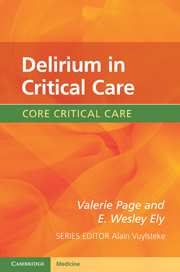Book contents
- Frontmatter
- Contents
- Foreword
- Delirium, a patient testimony
- 1 What is delirium in critical care?
- 2 How common is delirium in critical care?
- 3 What does delirium look like in critical care?
- 4 Delirium in critical care: how does it happen?
- 5 Delirium: what causes it? Risk factors
- 6 Delirium in critical care: why is it important?
- 7 Delirium in critical care: how do we diagnose it?
- 8 How to prevent delirium?
- 9 Treatment of delirium in critical care
- 10 Mental capacity and restraints
- 11 End-of-life care
- 12 What is the future?
- Selected references
- Index
Delirium, a patient testimony
Published online by Cambridge University Press: 05 December 2011
- Frontmatter
- Contents
- Foreword
- Delirium, a patient testimony
- 1 What is delirium in critical care?
- 2 How common is delirium in critical care?
- 3 What does delirium look like in critical care?
- 4 Delirium in critical care: how does it happen?
- 5 Delirium: what causes it? Risk factors
- 6 Delirium in critical care: why is it important?
- 7 Delirium in critical care: how do we diagnose it?
- 8 How to prevent delirium?
- 9 Treatment of delirium in critical care
- 10 Mental capacity and restraints
- 11 End-of-life care
- 12 What is the future?
- Selected references
- Index
Summary
As birthdays go, this one was absolute rubbish. It was 8 o'clock on a May evening in 2007, and where I should have been enjoying an evening out with my husband and friends, here I was sitting in A & E with a broken nose, the result of the most mundane of domestic accidents – falling over some washing while I was completely sober.
Two weeks later I was summoned for day surgery to sort the nose out. My conversation with a porter about the next day's FA Cup final, while making my way down to theatre, is the last memory I have before being plunged into the most terrifying experience of my life.
The next occasion when I had any perception of time was 12 days later, when I found myself being stared at by two middle-aged men in dark suits and bright ties. One was busily explaining to me that I was in the Intensive Care Unit and that I was quite safe.
However, I knew better. I knew they were lying. For me, the reason I was in a bed, on a ventilator, hardly able to move, was that I had been drugged and kidnapped. It had all started in Portugal; at least I thought it was Portugal, where I'd been abducted. At some point I'd managed to escape but was recaptured and taken to a hospital, a few miles from my home.
- Type
- Chapter
- Information
- Delirium in Critical Care , pp. xi - xviPublisher: Cambridge University PressPrint publication year: 2011

